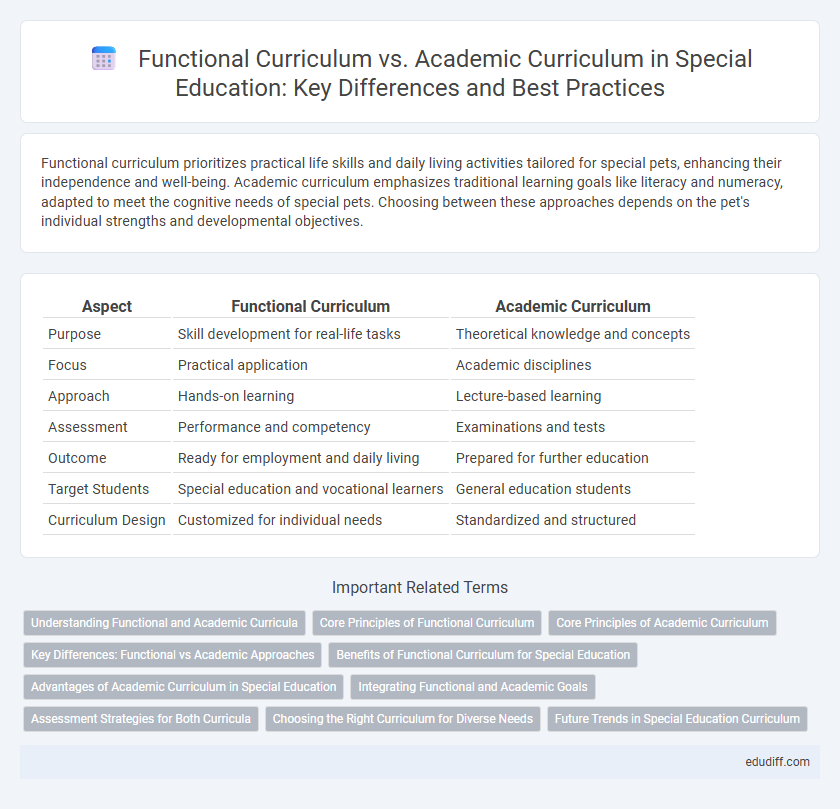Functional curriculum prioritizes practical life skills and daily living activities tailored for special pets, enhancing their independence and well-being. Academic curriculum emphasizes traditional learning goals like literacy and numeracy, adapted to meet the cognitive needs of special pets. Choosing between these approaches depends on the pet's individual strengths and developmental objectives.
Table of Comparison
| Aspect | Functional Curriculum | Academic Curriculum |
|---|---|---|
| Purpose | Skill development for real-life tasks | Theoretical knowledge and concepts |
| Focus | Practical application | Academic disciplines |
| Approach | Hands-on learning | Lecture-based learning |
| Assessment | Performance and competency | Examinations and tests |
| Outcome | Ready for employment and daily living | Prepared for further education |
| Target Students | Special education and vocational learners | General education students |
| Curriculum Design | Customized for individual needs | Standardized and structured |
Understanding Functional and Academic Curricula
Functional curriculum emphasizes practical life skills, communication, and daily living activities tailored for learners with special needs, enhancing their independence and social integration. Academic curriculum focuses on traditional subjects such as math, science, and language arts to develop cognitive knowledge and critical thinking. Understanding the distinction between these curricula is essential for designing effective education plans that address both practical skills and academic development.
Core Principles of Functional Curriculum
Functional Curriculum centers on practical life skills, emphasizing real-world applications that foster independence and social competence for learners with special needs. Core principles include individualized instruction tailored to students' unique abilities, community-based learning, and the integration of vocational and daily living skills. This approach contrasts with Academic Curriculum, which prioritizes theoretical knowledge and standardized assessment outcomes.
Core Principles of Academic Curriculum
The core principles of academic curriculum emphasize structured knowledge acquisition, mastery of subject-specific skills, and development of critical thinking through standardized content and assessments. This approach prioritizes cognitive rigor, systematic progression of concepts, and alignment with educational standards to prepare students for higher education and professional careers. Academic curricula foster intellectual growth by embedding theoretical frameworks and empirical evidence within a disciplined learning environment.
Key Differences: Functional vs Academic Approaches
Functional curriculum emphasizes practical life skills and real-world applications tailored for students with special needs, prioritizing independence and daily living competencies. Academic curriculum focuses on theoretical knowledge, cognitive development, and mastery of subjects like math, science, and language arts, aiming to meet standardized educational benchmarks. The key difference lies in the functional approach's goal of enhancing everyday functionality versus the academic approach's concentration on academic achievement and intellectual growth.
Benefits of Functional Curriculum for Special Education
Functional curriculum in special education emphasizes practical life skills, enhancing students' independence and daily functioning. It targets essential abilities like communication, self-care, and social skills, which are crucial for real-world success. This approach supports individualized learning goals, fostering meaningful engagement and improved outcomes for students with diverse needs.
Advantages of Academic Curriculum in Special Education
Academic curriculum in special education offers structured content aligned with state standards, promoting measurable progress in literacy, math, and science. It facilitates access to grade-level skills, fostering inclusion and higher expectations for students with disabilities. Furthermore, academic curriculum prepares students for postsecondary education and competitive employment opportunities by emphasizing critical thinking and knowledge acquisition.
Integrating Functional and Academic Goals
Integrating functional and academic goals in special education promotes comprehensive student development by aligning practical life skills with traditional academic content. This approach enhances individualized learning plans that address daily living, social communication, and cognitive skills alongside core subjects like math and literacy. Educators benefit from collaborative strategies that balance measurable functional outcomes with academic achievement to prepare students for real-world success.
Assessment Strategies for Both Curricula
Assessment strategies in functional curriculum prioritize practical skills and real-life applications, using performance-based evaluations, observational checklists, and portfolio assessments to measure student progress. Academic curriculum assessments emphasize standardized tests, quizzes, and written assignments to evaluate knowledge acquisition and critical thinking within subject-specific frameworks. Both curricula benefit from formative assessments to guide instruction, but functional curricula focus more on individualized, criterion-referenced measures while academic curricula rely heavily on norm-referenced scoring.
Choosing the Right Curriculum for Diverse Needs
Functional curriculum emphasizes practical life skills and independence, ideal for learners with special needs requiring real-world applicability. Academic curriculum prioritizes theoretical knowledge and subject mastery, suited for students aiming at traditional educational paths. Selecting the right curriculum depends on individual learning goals, cognitive abilities, and future aspirations, ensuring personalized educational outcomes.
Future Trends in Special Education Curriculum
Future trends in special education curriculum emphasize the integration of functional curriculum approaches that prioritize life skills, social communication, and vocational training over traditional academic content. Advances in assistive technology and personalized learning plans are enabling more adaptive, student-centered instruction tailored to individual strengths and needs. Collaboration among educators, therapists, and families is becoming essential to develop curricula that support lifelong independence and community participation for students with disabilities.
Functional Curriculum vs Academic Curriculum Infographic

 edudiff.com
edudiff.com